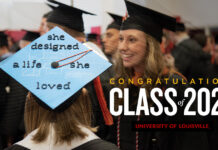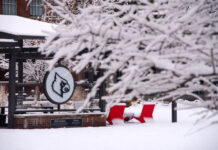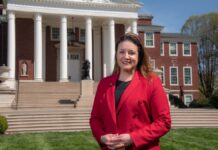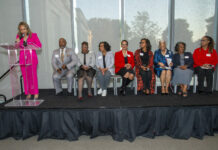U. S. Army Col (Ret.) Renee Finnegan, who heads the UofL-Fort Knox partnership, outlined for the trustees’ Academic and Student Affairs Committee some of the program’s key initiatives including plans to create a soldiers-only brain injury center at Jewish Hospital’s Frazier Rehab Institute.
Finnegan, who made the presentation along with Richard Goldstein, a physician and vice dean for clinical affairs at UofL’s School of Medicine, said there are only a few military-only concussion centers in the nation and none are located in the Midwest. According to Goldstein, the pilot program will focus on 350 soldiers at Ft. Knox with the hope of expanding care to soldiers on other military posts.
President James Ramsey said the university is modeling its Fort Knox partnership after its Signature Partnership Initiative which relies on direction and advice from a community-based board.
Finnegan said there are 38 initiatives underway between the university and military groups that encompass many areas including academics, research, training and business.
In other action, the committee approved a doctoral degree in Pan African studies.
The PhD in Pan African Studies will be the only degree of its kind in the commonwealth and one of only 11 in the country. Other schools offering such degrees include Harvard, Yale, Northwestern, California-Berkeley and Temple. According to the proposal, doctoral graduates in Pan African or Black studies are very marketable.
The degree already has been recommended by the Faculty Senate and approved by the Council on Postsecondary Education. If the full board approves it next month, UofL will begin offering the degree in Fall 2012.
The Finance Committee approved renovation of the Medical Dental Apartment complex and repairs to the exterior of the University Tower Apartments.
UofL’s Audiology/Speech Pathology Department plans to move into the Medical Dental Apartments. The renovation of the complex will turn the lower level into space for teaching labs and student study areas. The apartments on the second floor will be turned into offices. The cost is projected at $400,000.
The $407,000 University Tower project will include patching, sealing and other repairs to the exposed concrete and brick façade of the building, which is 47 years old.

























